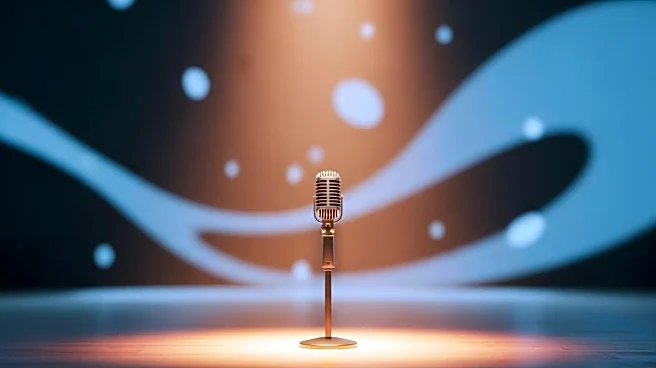What's Happening?
Glen Powell's new Hulu show, 'Chad Powers,' has been met with criticism for its mean-spirited humor. The series follows Powell as Russ Holliday, a disgraced college quarterback who reinvents himself as Chad Powers, a character inspired by Eli Manning's ESPN+ stunt. The show has been described as one of the worst ideas by staff writer William Hughes, who criticized Powell's portrayal and the show's premise. The series features Holliday's fall from grace after a public blunder at the Rose Bowl, leading to a series of unfortunate events, including a confrontation with a young fan and subsequent media fallout. Despite attempts to revive his career, Holliday's journey is marked by jock humor and a lack of genuine comedic value, according to reviews.
Why It's Important?
The reception of 'Chad Powers' highlights the challenges faced by entertainment productions in balancing humor with sensitivity. The show's portrayal of mean-spirited humor raises questions about the impact of such content on audiences and the responsibility of creators to avoid reinforcing negative stereotypes. The criticism may affect Hulu's reputation and influence future programming decisions, as viewers increasingly demand content that is both entertaining and respectful. The backlash also underscores the importance of thoughtful character development and narrative depth in television, which can significantly affect viewer engagement and satisfaction.
What's Next?
The negative reception of 'Chad Powers' may prompt Hulu and the show's creators to reconsider their approach to humor and character portrayal in future projects. There could be discussions about revising the show's content or addressing the criticisms publicly to mitigate potential damage to the network's image. Additionally, the entertainment industry might see a shift towards more inclusive and considerate storytelling, as audiences continue to voice their preferences for content that aligns with contemporary social values.
Beyond the Headlines
The controversy surrounding 'Chad Powers' reflects broader cultural shifts in the entertainment industry, where audiences are increasingly critical of content that fails to align with evolving social norms. This development may encourage creators to explore more diverse and empathetic narratives, fostering a more inclusive media landscape. The show's reception also highlights the potential for media to influence public perceptions and attitudes, emphasizing the need for responsible storytelling.










